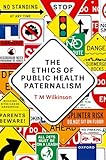The ethics of public health paternalism / T.M. Wilkinson.
Publisher: New York, NY : Oxford University Press, [2024]Edition: First editionDescription: pages cmContent type:- text
- unmediated
- volume
- 9780198895817
- WA 21
| Item type | Current library | Status | Barcode | |
|---|---|---|---|---|
 Open Access Books - Publishers
Open Access Books - Publishers
|
National Law School | Available | OABP718 |
Includes bibliographical references and index.
"The Ethics of Public Health Paternalism is about policies that try to stop people damaging their own health. From the point of view of public health advocates, if people did not smoke, or drank less alcohol, or kept off junk food and sugary liquids, they would tend to be healthier. Hence such tactics as taxing tobacco, restricting the sale of alcohol, and limiting the density of fast-food outlets. These tactics are often pejoratively described as the actions of a 'nanny state' that overvalues health and wrongly infringes on the autonomy of adults. But many of us want to be healthy rather than ill, and alive rather than dead. Does a state really nanny us when it uses its power to make us healthier? If it does, should it stop?"-- Provided by publisher.
There are no comments on this title.
